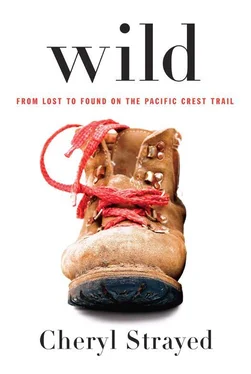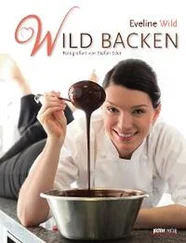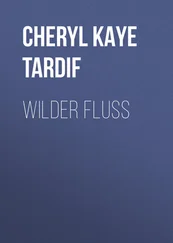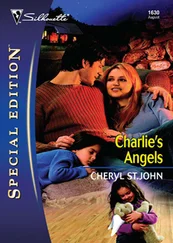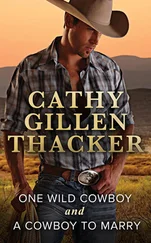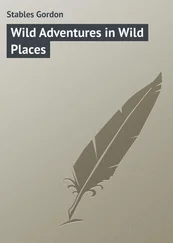Cheryl Strayed - Wild
Здесь есть возможность читать онлайн «Cheryl Strayed - Wild» весь текст электронной книги совершенно бесплатно (целиком полную версию без сокращений). В некоторых случаях можно слушать аудио, скачать через торрент в формате fb2 и присутствует краткое содержание. Год выпуска: 2012, ISBN: 2012, Жанр: Современная проза, на английском языке. Описание произведения, (предисловие) а так же отзывы посетителей доступны на портале библиотеки ЛибКат.
- Название:Wild
- Автор:
- Жанр:
- Год:2012
- ISBN:978-0-307-95765-8
- Рейтинг книги:4 / 5. Голосов: 1
-
Избранное:Добавить в избранное
- Отзывы:
-
Ваша оценка:
- 80
- 1
- 2
- 3
- 4
- 5
Wild: краткое содержание, описание и аннотация
Предлагаем к чтению аннотацию, описание, краткое содержание или предисловие (зависит от того, что написал сам автор книги «Wild»). Если вы не нашли необходимую информацию о книге — напишите в комментариях, мы постараемся отыскать её.
Wild — читать онлайн бесплатно полную книгу (весь текст) целиком
Ниже представлен текст книги, разбитый по страницам. Система сохранения места последней прочитанной страницы, позволяет с удобством читать онлайн бесплатно книгу «Wild», без необходимости каждый раз заново искать на чём Вы остановились. Поставьте закладку, и сможете в любой момент перейти на страницу, на которой закончили чтение.
Интервал:
Закладка:
Now that I was officially among the Three Sisters, I didn’t have the trail to myself anymore. On the high rocky meadows I passed day hikers and short-term backpackers and a Boy Scout troop out for an overnight. I stopped to talk to some of them. Do you have a gun? Are you afraid? they asked in an echo of what I’d been hearing all summer. No, no , I said, laughing a little. I met a pair of men my age who’d served in Iraq during Desert Storm and were still in the army, both of them captains. They were clean-cut, strapping, and handsome, seemingly straight off a recruitment poster. We took a long afternoon break together near a creek, into which they’d placed two cans of beer to cool. It was their last night out on a five-day trip. They’d hauled those two cans the whole time so they could drink them on the final night to celebrate.
They wanted to know everything about my trip. How it felt to walk all those days; the things I’d seen and the people I’d met and what in the hell had happened to my feet. They insisted on lifting my pack and were stupefied to find that it was heavier than either of theirs. They got ready to hike away and I wished them well, still lounging in the sun on the creek’s bank.
“Hey, Cheryl,” one of them turned to holler once he was almost out of sight on the trail. “We left one of the beers for you in the creek. We did it this way so you can’t say no. We want you to have it ’cause you’re tougher than us.”
I laughed and thanked them and went down to the creek to retrieve it, feeling flattered and lifted. I drank the beer that night near Obsidian Falls, which was named for the jet-black glass shards that wondrously cover the trail, making each step an ever-shifting clatter beneath me, as if I were walking across layers upon layers of broken china.
I was less wonder-struck the next day as I walked over McKenzie Pass into the Mount Washington Wilderness, and the trail became rockier still as I crossed the basalt flows of Belknap Crater and Little Belknap. These weren’t pretty shiny shards of rock among spring green meadows. Now I was walking over a five-mile swath of black volcanic rocks that ranged in size from baseball to soccer ball, my ankles and knees constantly twisting. The landscape was exposed and desolate, the sun searing relentlessly down on me as I struggled along in the direction of Mount Washington. When I made it to the other side of the craters, I walked gratefully among the trees and realized the crowds had disappeared. I was alone again, just the trail and me.
The following day I hiked over Santiam Pass and crossed into the Mount Jefferson Wilderness, named for the dark and stately summit to my north. I hiked past the rocky multipeaked Three Fingered Jack, which rose like a fractured hand into the sky, and continued hiking into the evening as the sun disappeared behind a blanket of clouds and a thick mist slowly enveloped me. The day had been hot, but within thirty minutes the temperature dropped 20 degrees as the wind picked up and then suddenly stilled. I walked as quickly as I could up the trail, the sweat dripping from my body in spite of the chill, searching for a place to camp. It was precariously close to dark, but there was no place flat or clear enough to pitch my tent. By the time I found a spot near a small pond, it was as if I were inside a cloud, the air eerily still and silent. In the time it took me to pitch my tent and filter a bottle of water with my insufferably slow water purifier, the wind started up again in great violent gasps, whipping the branches of the trees overhead. I’d never been in a mountain storm. I’m not afraid, I reminded myself as I crawled into my tent without eating dinner, feeling too vulnerable outside, though I knew my tent offered little protection. I sat in expectant wonder and fear, bracing for a mighty storm that never came.
An hour after dark, the air went still again and I heard coyotes yipping in the distance, as if they were celebrating the fact that the coast was clear. August had turned to September; the temperatures at night were almost always bitingly cold. I got out of my tent to pee, wearing my hat and gloves. When I scanned the trees with my headlamp, they caught on something, and I froze as the reflection of two bright pairs of eyes gazed back at me.
I never found out whose they were. An instant later they were gone.
The next day was hot and sunny, as if the strange storm the night before had been only a dream. I missed a fork in the trail and later discovered that I was no longer on the PCT but on the Oregon Skyline Trail, which paralleled the PCT roughly a mile to the west. It was an alternate route my guidebook detailed adequately, so I continued on, unworried. The trail would lead back to the PCT the next day. The day after that I’d be at Olallie Lake.
Hop, skip, jump, done .
I walked in a dense forest all afternoon, once rounding a bend to come upon a trio of enormous elks, who ran into the trees with a thunderous clamor of hooves. That evening, only moments after I stopped to make camp near a trailside pond, two bow hunters appeared, walking southbound down the trail.
“You got any water?” one of them burst out immediately.
“We can’t drink the pond water, can we?” asked the other, the desperation apparent on his face.
They both looked to be in their midthirties. One man was sandy-haired and wiry, though he had a little belly; the other was a redhead tall and meaty enough to be a linebacker. They both wore jeans with big buck knives hitched onto their belts and enormous backpacks that had bows and arrows slung across them.
“You can drink the pond water, but you need to filter it first,” I said.
“We don’t have a filter,” said the sandy-haired man, taking his pack off and setting it near a boulder that sat in the small clear area between the pond and the trail where I’d planned to camp. I’d only just set down my own pack when they’d appeared.
“You can use mine, if you’d like,” I said. I unzipped Monster’s pocket, took out my water purifier, and handed it to the sandy-haired man, who took it, walked to the mucky shore of the pond, and squatted down.
“How do you use this thing?” he called to me.
I showed him how to put the intake tube in the water with the float and how to pump the handle against the cartridge. “You’ll need your water bottle,” I added, but he and his big red-haired friend looked at each other regretfully and told me they didn’t have one. They were only up for the day hunting. Their truck was parked on a forest road about three miles away, down a side trail I’d recently crossed. They thought they’d have reached it by now.
“Have you gone all day without drinking?” I asked.
“We brought Pepsi,” the sandy-haired man answered. “We each had a six-pack.”
“We’re headed down to our truck after this, so we only need enough water to get us another bit, but we’re both dying of thirst,” the red-haired man said.
“Here,” I said, going to my pack to pull out the water I had left — about a quarter of one of my bottles. I handed it to the red-haired man and he took a long sip and handed it to his friend, who drank the rest. I felt sorry for them, but I was sorrier that they were here with me. I was exhausted. I ached to take off my boots and change out of my sweaty clothes, pitch my tent, and make my dinner so I could lose myself in The Ten Thousand Things . Plus, I got a funny feeling from these men, with their Pepsi and their bows and their big buck knives and the way they’d stormed right up to me. Something that gave me the kind of pause I’d felt way back in that first week on the trail, when I’d been sitting in Frank’s truck and I thought that perhaps he meant me harm, only to have him pull out licorice instead. I let my mind settle on that licorice.
Читать дальшеИнтервал:
Закладка:
Похожие книги на «Wild»
Представляем Вашему вниманию похожие книги на «Wild» списком для выбора. Мы отобрали схожую по названию и смыслу литературу в надежде предоставить читателям больше вариантов отыскать новые, интересные, ещё непрочитанные произведения.
Обсуждение, отзывы о книге «Wild» и просто собственные мнения читателей. Оставьте ваши комментарии, напишите, что Вы думаете о произведении, его смысле или главных героях. Укажите что конкретно понравилось, а что нет, и почему Вы так считаете.
